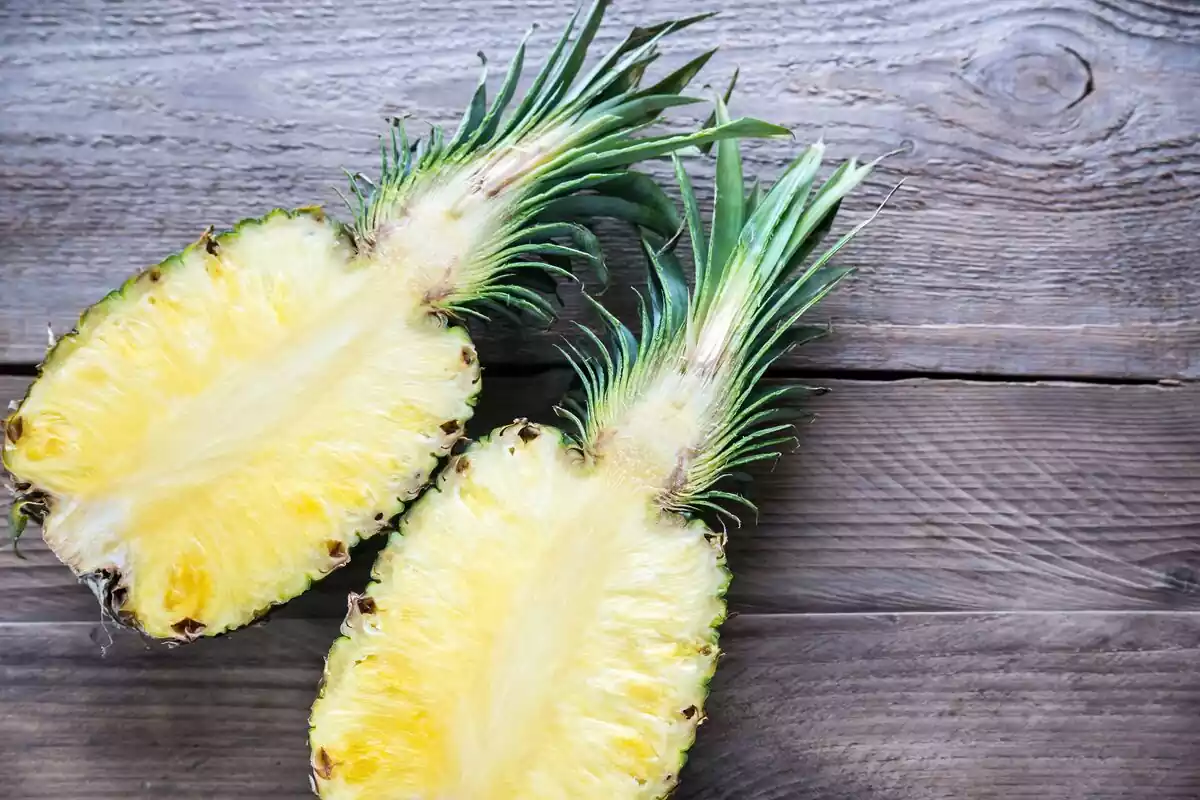If we're asked to name a tropical fruit, the first fruit that comes to mind is pineapple. This fruit has become more and more popular throughout the years due to its flavor and versatility, and to the multiple properties and benefits it has for our organism.
But how many of these supposed benefits are real and which are not? There is a long list of supposed benefits that pineapple has for our organism, but not all of them have been scientifically proved. Therefore, in this article, we will describe the main properties and benefits of pineapple that are supported by scientific evidence.
What is a pineapple?
Pineapple, also known by its scientific name Ananas comosus, is a tropical plant from South America. Although the exact location of its origin is not known, it is hypothesized that it belongs to the area between the south of Brazil and Paraguay.
Nowadays we can find pineapples around the world, and both its juice and its pulp are used in all kind of elaborations and recipes. In many countries with tropical weather, it is usually bought as a snack, while in other western countries it was popularized as a cooked garnish for meat.
Due to its thick skin, this tropical fruit is usually opened and cut into slices or pieces to be included in desserts such as fruit salads or even make a pineapple cake, as well as in other salty dishes such as the controversial pineapple pizza, among many other preparations.
Its pulp can be used as an ingredient to go with yogurt, to make jam, and to make sweets and ice-creams. Pineapple juice is usually served as a drink, but it is also one of the main ingredients of some cocktails, such as piña colada.
Pineapple benefits
As we mentioned at the beginning of the article, the pineapple has infinite health properties. This, together with its freshness and its peculiar slightly acid taste, has made this fruit one of the most popular foods for both adults and children.
However, which of its benefits are true? To solve this question, we present 8 properties and benefits that are supported by scientific research.
1. It is rich in vitamins and nutrients
One of the main benefits of pineapples is that they are low in calories but retain a very complete nutrient profile.
Among the primary nutrients and vitamins, we find fiber, proteins, carbohydrates, magnesium, copper, thiamine, folate, potassium, magnesium, niacin, pantothenic acid, riboflavin, iron, and vitamin C.
Moreover, even though these are present in less quantity, pineapples also have some vitamin A, vitamin K, phosphorus, zinc, and calcium.
Vitamin C is an essential element to favor the correct development of the body, it helps to keep a healthy immune system, and it boosts the absorption of iron of the diet.
Manganese is a natural mineral that favors growth, maintains a healthy active metabolism and has excellent antioxidant properties.
2. It is rich in antioxidants
Pineapples, apart of being a great source of nutrients, are very rich in antioxidants, which are molecules that help combat oxidative stress caused by free radicals found in our body.
This oxidative stress favors the aging of systems and tissues, and it can also cause damage related to chronic inflammation, weakening of the immune system and all kinds of diseases or organic conditions.
Although most fruits and vegetables contain natural antioxidants, in pineapples there are some antioxidants known as flavonoids and phenolic acids. In addition, many of these antioxidants are bound together, allowing them to survive harsher conditions in the body and produce for longer.
3. It favors immune system activity
As we have seen previously, pineapples contain a wide variety of vitamins, minerals, and enzymes, such as bromelain, that can boost the action of the immune system and eliminate inflammation.

4. It makes digestion easier
As well as serving as an engine to support the immune system, bromelain is also known for its beneficial effects on digestion. This enzyme breaks down protein molecules into more basic components, such as amino acids and small peptides, which are easier for the small intestine to absorb.
This can be extremely interesting for people with conditions such as pancreatic deficiency. A disease in which the pancreas is not able to produce enough digestive enzymes.
5. It can improve diabetes
According to studies, people with type 1 diabetes who follow diets high in digestive fiber tend to have lower blood glucose levels. Similarly, people with type 2 diabetes can improve blood sugar, lipids, and insulin levels with fiber intake.
Considering that a ration of pineapple of approximately 150 grams contains 2.3 grams of dietary fiber, this fruit is an ideal option for regulating blood sugar levels.
6. It can relieve symptoms of arthritis
Although there are many types of arthritis, most of them involve joint inflammation. As the bromelain of pineapples has anti-inflammatory properties, the hypothesis is that it can relieve pain for people with inflammatory arthritis.
However, scientific research has failed to clarify whether bromelain can be a long-term treatment for arthritis symptoms, so, much more research is still needed before recommending bromelain as a symptomatic treatment for arthritis.
7. It can speed recovery after surgery or strenuous exercise
The results from the studies regarding the anti-inflammatory properties of bromelain, present in pineapples and many other fruits, vegetables, and foods, suggest that it can reduce the time it takes the body and tissues to recover from a surgical procedure or intervention, as well as from intense or strenuous physical exercise.
These investigations prove that the bromelain present in this fruit can reduce inflammation, swelling, hematomas, and pain that usually appear after surgery.
In addition, intense physical exercise can also harm the muscle tissue causing inflammation. It is believed that protease enzymes, such as bromelain, may speed recovery from damage caused by strenuous exercise by reducing swelling around damaged muscle tissue.
8. It can help reduce the risk of cancer
Some research points to the possibility that pineapple, and the compounds and nutrients it has, can be relatively effective when reducing the risk of cancer.
This is because the appearance and progression of the different types of cancer have been related to oxidative stress and chronic inflammation, so it is hypothesized that the antioxidants of pineapple can reduce this risk thanks to the beneficial effect it has on both factors.
However, it is necessary to specify that these studies have not yet been performed in humans. This implies that much more research is needed before coming to a firm conclusion.
References
Li, T., Shen, P., Liu, W., Liu, C., Liang, R., Yan, N. & Chen, J. (2014). Major Polyphenolics in Pineapple Peels and their Antioxidant Interactions. International Journal of Food Properties, 17 (8): 1805.
Stahl, J. M., Nepi, M., Galetto, L., Guimarães, E. & Machado, S. R. (2012). Functional aspects of floral nectar secretion of Ananas ananassoides, an ornithophilous bromeliad from the Brazilian savanna. Annals of Botany, 109 (7): 1243–1252.
Wang, Y., Cui, R., Xiao, Y., Fang, J., & Qing Xu. (2015). Effect of carotene and lycopene on the risk of prostate cancer: a systematic review and dose-response meta-analysis of observational studies. PLOS ONE, 10(9).
